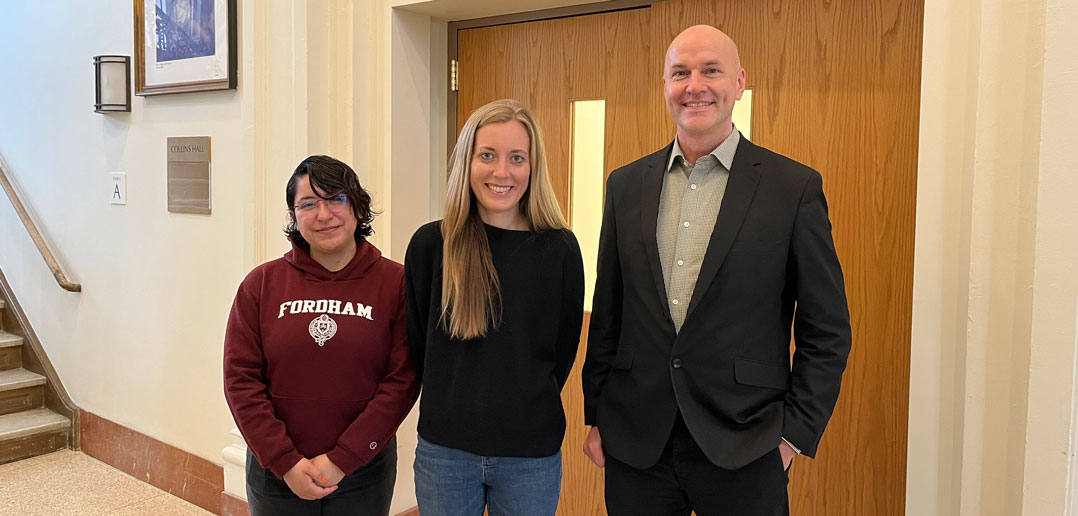Fordham’s Stephen Grimm, Ph.D., professor of philosophy, was awarded the three-year, $300,000 grant in November 2021 to launch the program, titled “Visions of the Good in the Bronx,” that aims to work with students from the borough, particularly those who are underserved or might not have access to the same resources as their peers. Following the summer session, the students will also have access to a year-long mentoring program.
What Makes a Good Life?
The program aims to have the students contemplate what they think would make for a good life.
“We’re trying to think about the kind of lives we want to lead,” Grimm said. “We have this vision of what makes for a good life and what things are more important in that life and what things are less important.”
For some people, honor is the most important thing, Grimm explained, while others prioritize wealth or friendship.
“What we’re going to do in this seminar is look at what different philosophers, different traditions, different cultures have said about the good life.” Grimm said. “And what’s their vision of the good? So we’re going to look through ancient Greek and Roman philosophy, ancient Chinese philosophy, the Enlightenment, all the way up to 20th-century figures like Martin Luther King, Jr.”
The target group of high school juniors should be underserved and first-generation college students from the Bronx, Grimm said, for whom “the whole college application process could be quite intimidating.”
Helping Students Find Their Voice
Layla Mayorga, a first-year Ph.D. student in philosophy, who will serve as a graduate student mentor in the program, said she is especially interested in using this seminar to help first-generation and other underserved students find their voice.
“The skill that I would like to see them (gain) is not to be afraid to speak up for themselves, especially as first-gen (students),” she said. “Because I know as first-gen, a lot of us are just afraid to talk—afraid to talk to the teacher or proctor—and I feel like in college that would be an essential skill so they can actually get the answer rather than just leaving the class and just wondering.”
The program will run for three weeks and be structured so students spend most of those three weeks at Fordham, staying on campus during the week and heading home on the weekends.
Each day, the students will have seminar classes in the morning taught by Grimm and Vita Emery, Ph.D., a postdoctoral teaching fellow who received her Ph.D. at Fordham in 2021. In the afternoon, there will be teacher assistant sessions where Fordham undergraduate students—who will be overseen by Mayorga—will do work with the students that supplements the seminars. Students will be given time every day to complete their readings as well as time to get help with their writing skills. There will also be a few field trips during the program, he said.
Grimm said he, Emery, and Mayorga met with the instructors of a similar program at Columbia, called Freedom and Citizenship, to help establish this model.
Emery, who will be serving as the program coordinator, said that she was excited to help the students explore these bigger questions.
‘Doing Philosophy’ Without Realizing It
“I love teaching and I love having conversations with students,” she said. “I think people are doing philosophy a lot of the time and they don’t realize it. And so when you have those moments where students are like, ‘oh wait, I’ve been asking this question for years. I just hadn’t put it quite in these terms’—that’s a very exciting moment.”
The goal is for students to walk away from the program with philosophical skills that can help them in life as well as reading and writing skills that can help them in their next steps, Grimm said.
“I think just wrestling with these big questions about what constitutes a good life, and what we owe to each other as people, is inherently worth doing,” he said. “Teagle has a special concern for citizenship and thinks that wrestling with these classic (philosophy) texts—or as they call them transformative texts—is really important for a democracy.”
A Glimpse of College Life
There will also be some college prep resources to help make the college admissions process a bit less intimidating, including help with college essays. After the seminar is complete, the students will also receive letters of recommendation, which they can use for their college applications.
Mayorga said that she also hopes that this gives the high school students a chance to really “see what college life is like” instead of having a vague picture in their minds.
“A lot of them grow up with the idea that they will never actually attend college—I was one of them,” Mayorga said. “They don’t actually know what their life is going to be. … If we show them there’s opportunity, there’s actually a choice in your life—it will be very helpful. It will open their eyes.”
Applications are currently open until March 25 for high school juniors in the Bronx.

